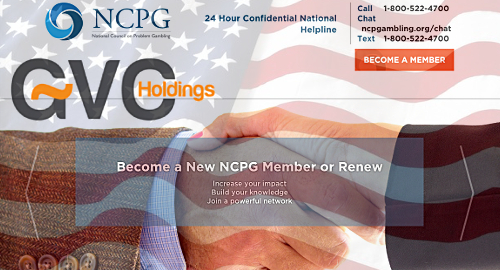 UK-listed gambling operator GVC Holdings is demonstrating its commitment to conquering the US market by helping to fund a new study into problem gambling.
UK-listed gambling operator GVC Holdings is demonstrating its commitment to conquering the US market by helping to fund a new study into problem gambling.
On Wednesday, GVC announced that it had joined the President’s Circle of the National Council on Problem Gambling (NCPG), America’s leading advocate for program and services to assist problem gamblers and their families.
GVC’s commitment to the NCPG includes helping to fund the National Survey of Gambling in America, a new study aimed at quantifying gambling prevalence in the US of A and establishing a baseline by which to judge the scope of problem gambling behavior.
GVC CEO Kenny Alexander celebrated his group joining the NCPG’s efforts, which he said “reinforces our commitment to ensure that GVC promotes the highest standards of responsible gaming while ensuring our customers can enjoy our products in a safe environment.”
NCPG executive director Keith Whyte welcomed GVC to its President’s Circle, an initiative that involves “essential multi-year contributors who support overall operations, sustainability, future growth and innovation.”
Current President’s Circle members include major land-based gaming operators such as Las Vegas Sands, Mohegan Sun, Caesars Entertainment, International Game Technology and MGM Resorts.
GVC has partnered with MGM on a US-facing joint venture to explore online sports betting, casino and poker opportunities where such activities are legal, and GVC is clearly eager to make a good first impression in a market that could prove a major contributor to the company’s bottom line over the next decade or so.
SKY BET CEO SAYS GAMBLING COMPANIES CAN DO BETTER
Back in GVC’s home market, Richard Flint, CEO of Sky Betting & Gaming (SBG), published an op-ed in the Telegraph pushing back against increasingly strident calls to rein in gambling advertising, proposing instead that gambling firms be required to funnel part of their ad budgets into responsible gambling messaging.
Flint acknowledged the high concentration of gambling advertising in sport, as evidenced by the number of betting promos appearing in this summer’s FIFA World Cup broadcasts, but suggested that a pre-watershed hour advertising ban and an end to football club sponsorships wasn’t “the most effective way of getting to grips with problem gambling.”
Flint argued that purging gambling ads from television would deprive responsible gambling initiatives of much of their ability to promote their services directly to their target audience. Furthermore, Flint noted that countries that have opted for blanket advertising bans have yet to eradicate problem gambling within their borders, strongly suggesting that an alternative approach is required.
Flint proposed that gambling operators be required to dedicate an unspecified proportion of their ad budgets to spots educating consumers on responsible gambling practices. Flint says SBG already devotes “a defined portion” of its marketing spend on safer gambling promos “and would be relaxed about that being codified into law.”